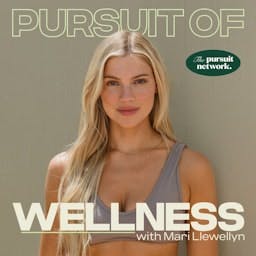.jpg)
Mindfully Integrative Show
Welcome to the Mindfully Integrative Podcast! We are dedicated to featuring inspirational and successful individuals who have embraced mindful investing to achieve optimal integrative wellness. Our podcast dives into all aspects of mindfully incorporating integrative functional health into our lives, aiming to help create a more balanced and fulfilling life. New episodes are released every Friday and cover a wide range of informative and entertaining topics, interviews, and discussions.
We explore a mindful approach to the mind-body connection with guests discussing various topics in integrative holistic health. This includes areas such as whole health, functional medicine, spiritual health, financial health, mental health, lifestyle health, mindset shifts, physical health, digital health, nutrition, gut health, sexual health, body positivity, family health, pet health, business health, and life purpose, among others.
Dr. Damaris G. is an Integrative Doctor of Nursing Practice, a Family Nurse Practitioner, a mom, and a veteran. For collaboration, interviews, or to say hi, you can contact her via email at damaris@mindfullyintegrative.com. You can also find her on LinkedIn at or https://www.linkedin.com/in/damarisdnp/. To join our membership and access resources, visit our website at https://mindfullyintegrative.com .
Please note that the information shared here is for informational and educational purposes only and should not be considered medical advice. Always consult with a physician or other licensed healthcare provider when making healthcare decisions. Enjoy the podcast!
Mindfully Integrative Show
Beyond Hunger: The Hidden Connection Between Blood Sugar and Metabolic Health
Sponsor Affiliates
Empowering Your Health
Get YOUR Own
Joburg Protein Snacks
Discount Code: Damaris15 Or Damaris18
Feeling need to Lose Weight & Become metabolically Healthy
GET METABOLIC COURSE GLP 1 REseT
This course is designed for individuals looking to optimize their metabolic health through integrative and functional medicine approaches. Whether you're on a GLP-1 medication or seeking natural ways to enhance your metabolic function, this course provides actionable steps, expert insights, and a personalized roadmap sustainable wellness.
Are you feeling stressed, tired, or Metabolism imbalanced?
Take advantage of our free mindful steps to help improve your well-being.
ENJOY ONE OF our Books
Mindful Ways Health Wealth & Life
https://stan.store/Mindfullyintegrative
Join Yearly membership ALL IN ONE FUNCTION HEALTH
Ask Us for help...
Hi, how are you? Let's talk about the lesson of a, excuse me. Uh, let's talk about, you know, combination of your blood sugar and balancing meals. Um, I talked briefly on this on the previous lesson but, um, I wanted to just kind of touch base and let you know where, how to kind of dive into that a little bit more.
Speaker 1:So, how do you stabilize your blood sugar? By optimizing it from GLP-1 function. You're supporting long-term metabolic health. You do this by finding simple meals, ways that can keep you at a blood sugar steady that will help prevent you from that midday crash. How do you do that? By blood sugar, glp one, metabolisms, because they're connected. You do this because, um, you structure meals in a functional nutritional way, and I'll give you some examples. So, first, the connection between blood sugar and um are in our bodies, right. So let's think of it like how do we regulate the blood sugar, the GLP one and the metabolism?
Speaker 1:Oh, I've spoken numerous times on this and we're trying to get you back to balance, not too high, not too low, not complete survival, but to get you where you're not getting cravings, not having metabolic um or having, you know, not amount, crazy amounts of fat storage. You're trying to keep yourself at a stable level. You're trying to avoid those blood sugar spikes. You're trying to get yourself from not having a flood of insulin within the body. You're because what that does that gives you fat storage and energy crashes and you get so many cravings. When your blood sugar does crash, it leads to irritability, you become hangry, you're overeating at your next meal. If you're fatigued, you have brain fog list goes on from there. Then that could lead into a cascade of chronic imbalances within the body, like brain salemia, which means then you get problems with you're feeling hungry too soon. The hormones of gall and leptin are not satisfying you. You're getting hungry, you have poor blood sugar, you have slow and fast metabolism. Then this can lead to chronic illnesses that cause more insulin within the body, inflammation, and then the list goes on.
Speaker 1:How do you balance like this? How do you do it? What's going on? Whole foods, nutrient dense foods. Instead of worry about what to take out, think about what you're putting in protein, fiber rich veggies, healthy fats, ultra processed foods. Get rid of them. You know. If it's the crap, don't eat it. You know I'm sick to more of a meal timing than I've spoken with before. Try to eat between about three to five hours, or one good quality meal and two smaller, hydrate, hydrate, hydrate and move the body and then, of course, sleep. So those are, no matter what, will always be factors in life.
Speaker 1:Now, key components in the blood sugar balance are your macros. So understanding protein, fiber, fats and balancing your sugar. So it's protein, carbs, fats. But think about, instead of just carbs, think about nice quality, dense fiber, healthy fat and protein. You always, if you can do a good balance there, you're going to have balanced sugar.
Speaker 1:How do we do this? We stimulate with protein. It stimulates the secretion of JLP1 from the L cells in the small intestines. This helps preserve muscle. By giving you more protein. It reduces your hunger and stabilizes your insulin levels. Um reduces your hunger and stabilizes your insulin levels.
Speaker 1:The healthy fats slows the digestion, lowers the glucose spikes, improves your hunger. That you have. When you absorb um fat soluble vitamins like vitamin a, e and k. A vitamin a and d, e and k, your body is more likely to feel full and feel good. Fiber, non-starchy vegetables those like that are broccoli, cruciferous vegetables, greens. That slows down the breakdown of the carbohydrates. That helps you with your gut bacteria. It helps boost more thing, your GLP-1. Naturally it helps regulate your bowel movements.
Speaker 1:The fiber moves things along. It supports detox, because detox is not only removing the waste within the GI system by excreting it through stool, but it is also through cleaning out the liver. So the detox is a combination of trying to get you hydrated and clear out all that excess and then clear out the fiber cups you know, roto-rooter that stuff in the colon and in the actually the entire GI system by eating that. So if you're going to go for complex carbs, please go for the complex, not the simple carbs. And that gives you more of a sustained energy, like sweet potatoes, quinoa, legumes, oats, things of that nature.
Speaker 1:And how do you do it? The combination is always protein, veggie, fat. That's how you would eat. You could actually start with the veggie combo, the protein and then the fat or um. Think of it like you're going to bring in um sustainable energy. You always want to have that in your body. There is it, it absorbs it. So the fiber like will break up, let's say it goes protein. Then you're going to have your quality veggie, then you're going to have the fiber and the fat and then that will help break down any excess glucose spikes and that's where you're going to become metabolically healthy. So there is a way to eat, there is timing and it is what you put into your body.
Speaker 1:Now let's, I will put in examples of sample breakfast, lunch and dinners. I promise, for example, eggs, spinach and avocado. There you've got your protein, you've got your greens and you've got your fat. There you go. There's no spike. I have that almost every single day. If I'm not having an egg, it's probably going to be yogurt. Next snack Greek yogurt, chia seeds, blueberries, protein, fiber, antioxidants the chia seeds helps with any sort of sugar spike and the antioxidants blueberries.
Speaker 1:Dinner, salmon, kale, cauliflower. You've got your omegas, you've got the protein. You've got your GLP-1 cruciferous vegetables to help boost your GLP and you got your cauliflower, which is fibrous and also nutritious Chicken. So it's like keep it simple. And if you start putting a bunch of junk in there and you wonder why it's not good or it may not taste as good, but you can season things. I mean, you can still use cheese, you can still use things. You just have to modify it. You know it. You cannot think that, um, having the fried food is is going to get you healthy. You put the crap in, you're going to feel like crap. You put the good stuff in. You're going to feel really good.
Speaker 1:Tips for meal prep I usually have proteins done earlier in the week, then I have like a batch of veggies done and then I'll have some starches, and sometimes I'll just put it together and then I'll season it differently and I'll change it up like that, so it's like I'll have that in the fridge and I'll make it quicker. Sometimes I'll buy a rotisserie. Sometimes I'll have it pre-steamed just so that I can feel like it's been done. I'll even buy pre-steamed bags of veggies and things if I'm really trying to get quick meals on the go.
Speaker 1:If you really want to get yourself motivated, you know, give yourself a challenge. Take pictures, look at what your food is that you're having every day, and does it meet that criteria that I'm stating? Is it in that meal prep, protein, veggie, or do you notice you're getting like a big old salty burger with French fries and who knows what? If you can't take a picture of it and you're feeling a little embarrassed, that should give you an idea. Maybe there's. You know there's room for improvement.
Speaker 1:It's okay to eat certain foods. Just become aware of where you are and how you can balance it out Like, for example, if you're going to have like a slice of pizza that next day, I want you to be modifying about where your, where your protein intake is and where even that next meal it's. It's okay to have cheat moments. It's okay to you know, eat, you know. I want you to feel comfortable in your body and where you're at, but understand, you know where you need to be the most metabolically healthy. That's our goal. That's what we're trying to do for, or at least to let you be knowledgeable in this course to understand them. I hope this helps on this and I'll give you a little bit more takeaways and snack ideas in the extra action plans. Talk with you soon.
Podcasts we love
Check out these other fine podcasts recommended by us, not an algorithm.

The Dr. Hyman Show
Dr. Mark Hyman
Functional Fertility with Dr. Kalea Wattles
Kalea Wattles
On Health for Women
Aviva Romm
Save Yourself With Dr. Amy Shah
Dr. Amy Shah
Huberman Lab
Scicomm Media
The Peter Attia Drive
Peter Attia, MD
The Metabolic Classroom with Dr. Ben Bikman
Insulin IQ
FoundMyFitness
Rhonda Patrick, Ph.D.
Change Your Brain Every Day
Dr Daniel & Tana Amen
The Dr. Josh Axe Show
Dr. Josh Axe
Pursuit of Wellness
Mari Llewellyn & Pursuit Network
Feel Better, Live More with Dr Rangan Chatterjee
Dr Rangan Chatterjee: GP & Author
The Level Up Podcast w/ Paul Alex
Paul Alex Espinoza
Faith Over Fear
Jennifer Slattery, Faith Over Fear Author and Speaker
